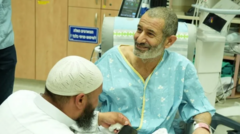A Bedouin Arab hostage rescued from an underground tunnel in Gaza said one of his fellow detainees died next to him during his time in captivity, a former Israeli official said.
Kaid Farhan Elkadi was rescued on Tuesday in a “complex operation in the southern Gaza Strip”, the Israeli military said.
Mr Elkadi has not yet spoken publicly, but the former mayor of a southern Israeli town said the 52-year-old was hardly exposed to sunlight for eight months.
His cousin also said Mr Elkadi was not treated differently in captivity despite being Muslim.
Mr Elkadi was kidnapped by Hamas during the 7 October attack on Israel and is the eighth hostage rescued by Israeli forces since the start of the war in Gaza.
The father of 11 is in a stable condition in hospital, where he is undergoing examinations.
Mr Elkadi told his relatives “about difficult days, a very cruel captivity”, Ata Abu Medigam, ex-mayor of the southern Israeli town of Rahat, told Israel’s Haaretz newspaper.
“He spoke about one of the hostages who was held captive with him for two months and died next to him,” Mr Medigam said.
Mr Elkadi had also started worrying about losing his eyesight, Mr Medigam added.
“He would check his eyes to see if they were still working and functioning – he would put his fingers on his eyes to check his reflexes.”
The Israeli military said forces had found Mr Elkadi in a tunnel “when he was alone”.
In a statement, the military said no further details about the rescue could be published “due to considerations of the safety of our hostages, the security of our forces, and national security”.
But some details have been emerging about Mr Elkadi’s time in captivity.
His cousin, Fadi Abu Sahiban, said Mr Elkadi did not get preferential treatment due to being a Muslim.
“They didn’t give him concessions because he’s a Muslim. He says they let him pray, that’s the only thing they allowed him to do,” he told Haaretz.
Mr Elkadi had no way of communicating with the outside world and was in constant fear of bombs overhead, his cousin said.
He “would hear the shelling of the IDF endlessly, he said his body was shaking”, said Mr Abu Sahiban.
“Every day he was sure was his last day, and not only because of his captors, but also because of the shelling of the army. He said that every day is a life-threatening situation.”
In a phone call with Israeli Prime Minister Benjamin Netanyahu from hospital, Mr Elkadi said: “I’ve been waiting for this moment. I swear to you,” adding “there are other people waiting”.
Mr Elkadi, a grandfather of one, is from a Bedouin village in the Rahat area of the Negev desert.
He worked for many years as a security guard at Kibbutz Magen, close to the Israel-Gaza border, where he was abducted 10 months ago.
The Israeli military launched a campaign to destroy Hamas in response to the unprecedented attack on southern Israel on 7 October, during which about 1,200 people were killed and 251 others were taken hostage.
More than 40,530 people have been killed in Gaza since then, according to the territory’s Hamas-run health ministry.
US, Egyptian and Qatari mediators are trying to broker a ceasefire deal that would see Hamas release the 104 hostages still being held, including 34 who are presumed dead, in exchange for Palestinian prisoners in Israeli jails.
Indirect talks have continued in Cairo in recent days, but so far there has been no sign of a breakthrough over key sticking points. They include Mr Netanyahu’s demand that Israel keep troops along Gaza’s border with Egypt, which Hamas has rejected.
Two other Bedouin Arabs – Yousef Zyadna and his son, Hamza – are among the remaining hostages who are still alive, while the body of a third, Mhamad el-Atrash, is still being held by Hamas.
Another Bedouin, Hisham al-Sayed, has been held captive in Gaza since 2015.

